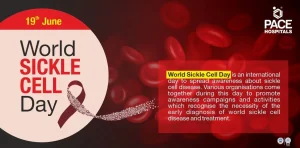
Game-Changing Milestone: FDA Approves First Gene Interventions to Treat Patients with Sickle Cell Disease
The FDA(Food and Drug Administration) has approved two remarkable gene therapies, Casgevy and Lyfgenia, to manage sickle cell disease (SCD). In a press statement on 8th December 2023, the United States FDA announced these approvals engineered by Vertex Pharmaceuticals Inc. in partnership with CRISPR Therapeutics (Casgevy) and Bluebird Bio Inc. (Lyfgenia).
Both therapies are the first-ever gene therapy for sickle cell disease (SCD) globally, tailored for patients aged 12 and older.
Casgevy has also been the first FDA-approved treatment using CRISPR/Cas9 genome editing technology- a Nobel prize award-winning tool that has until now remained experimental.

The approvals highlight significant advancements in gene therapy, a beacon of hope for those severely impacted by the condition.
Nicole Verdun, M.D. at the Office of Therapeutic Products at the FDA Center for Biologic Evaluation and Research, described SCD as a rare, debilitating, and life-threatening blood disorder with significant unmet needs. He further noted that advancements in cell-based therapies are critical in ensuring better living conditions for people with severe diseases.
The mechanism of action of these two novel therapies differ slightly but involve a hemopoietic stem cell transplant procedure. Patients’ blood stem cells will be modified and infused back in a one-time, single-dose procedure that will cost $2.2 million per patient for Casgevy and $3.1 million per patient for Lyfgenia.
Lyfgenia utilizes a gene-therapy-derived hemoglobin that functions similarly to hemoglobin A, the normal Adult hemoglobin in those unaffected by the disease. Lyfgenia’s approval followed a 24-month multicenter study in SCD patients aged 12 to 50. The therapy showed an 88% success rate in resolving painful episodes between 6 and 18 months post-infusion, with side effects like fever, low blood cell counts, and mouth sores.
Lyfgenia has a black box warning due to its observed association with hematologic malignancies like leukemia. The FDA mandates that there is a need for close monitoring of patients receiving either of the therapy for long-term health implications.
However, Casgevy employs CRISPR/Cas9 technology to edit the patients’ genome and amplify its expression of fetal hemoglobin(HbF).
HbF compensates for the aberrant hemoglobin associated with SCD and limits the sickling of red blood cells in those with the condition.
The clinical evaluation of Casgevy with adult and adolescent SCD patients as part of the study demonstrated a 93.5% success rate in preventing severe episodes of pain. Notable Side effects include mouth sores, nausea, low white blood cells and platelet count.
Read: Osimhen, Oshoala, Chiamaka Shines Bright at 2023 CAF Awards
About The Author
Related Articles
The AFCON Final in Morocco and the Controversies That Followed
The Africa Cup of Nations final between hosts Morocco and Senegal ended...
ByWest Africa WeeklyJanuary 20, 2026Mali’s Transition Leader Attends Swearing-In of Guinea’s President Mamadi Doumbouya
Mali’s President of the Transition, General Assimi Goïta, represented the country in...
ByWest Africa WeeklyJanuary 19, 2026Malian Army Conducts Successful Surveillance Operation in Mopti Region
The Malian Armed Forces have carried out a successful territorial surveillance operation...
ByWest Africa WeeklyJanuary 19, 2026Niger’s Security Forces Record Major Gains Against Armed Groups
Niger’s Defence and Security Forces have reported significant results following a week...
ByWest Africa WeeklyJanuary 19, 2026











